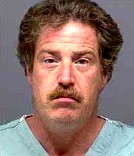Ward Francis Weaver III (born April 6, 1963) is a convicted felon. He is serving a life sentence without possibility of parole for sexual assault, rape, attempted murder, and the murders of Ashley Pond and Miranda Gaddis in Oregon City, Oregon.
Early life and prior marriages
In 1967, Ward Weaver's father abandoned the family. A few years later, Weaver's mother, Trish, married Bob Budrow, an abusive alcoholic.
Weaver first exhibited antisocial behavior as a teenager;his sister, Tammi, later said that he physically and sexually abused at least one family member by the time he was 12. In 1981, a teenaged relative reported that he had repeatedly raped and beat her. Police investigated allegations of abuse in 1981, but Multnomah County prosecutors decided not to pursue charges, because Weaver had enlisted in the armed services and would be leaving Portland.
In 1981, Weaver joined the US Navy Reserve. He was discharged on May 17, 1982, for heavy drinking and dereliction of duty. While in the Navy, he met his future wife, Maria Stout. The couple moved in with Weaver's parents, and she was soon pregnant. Weaver attacked her and put her in the hospital when she was five months pregnant, but she refused to press charges. She eventually bore him a son, followed by a daughter seven years later.
At about this time of his son's birth, Weaver's father was convicted of murder and sentenced to death.
Some time later, Weaver and his wife moved in with the Ordanas family. One night, an intoxicated Weaver attacked 15-year-old Jennifer Ordanas with a concrete block. She escaped, and Weaver was sentenced to three years in prison for assault.
In 1993, Maria Weaver filed a restraining order against her husband, and their marriage ended in divorce. In July 1995, Weaver beat his new girlfriend, Kristi Sloan, with a cast-iron skillet. He was jailed for the incident, but Sloan refused to testify against him. By October they were back together and, in February 1996, they married. The marriage lasted four years.
Murders of Ashley Pond and Miranda Gaddis
In August 1997, Weaver began an affair with a woman he met at work. They eventually moved into his rental house on South Beavercreek Road in Oregon City. Weaver's 12-year-old daughter became friends with Ashley Marie Pond (born March 1, 1989) and Miranda Diane Gaddis (born November 18, 1988.)
In August 2001, Ashley accused Weaver of attempting to rape her, but the police didn't investigate. On January 9, 2002, Ashley disappeared on her way to school. Friends and family, including Miranda, began to search for her.
Two months later, on March 8, Miranda vanished. Neither girl was ever seen alive again. After the girls vanished, Weaver (with the help of his son), dug a hole in his yard and covered it with cement; Weaver told his son it was a pad for a hot tub.
On August 13, Weaver was arrested for raping his son's 19-year-old girlfriend. Upon calling 9-1-1, Weaver's son told emergency dispatchers that his father admitted killing Ashley and Miranda. On the weekend of August 24-25, FBI agents found the remains of Ashley Pond beneath the concrete slab in his backyard. The next day they found the remains of Miranda Gaddis in a bag in the storage shed.
News coverage
Portland Tribune reporter Jim Redden got two tips early on – one from Linda O'Neal, a private investigator and a relative of Pond – which prompted him to interview Weaver. Weaver told Redden that he was the FBI's prime suspect, at a time when it was generally believed there was no such suspect.
KATU television news reporter Anna Song conducted an interview with Weaver prior to his arrest. During the interview, Weaver stood on top of the concrete slab where one of the bodies was buried.
O'Neal went on to write a book about the case. The book was somewhat fictionalized, featuring composite characters and reconstructed conversations. O'Neal contended that the substance of the book was accurate, but the FBI criticized the book, and took exception to O'Neal's characterization of how the case was solved.
Aftermath
On October 2, 2002, Weaver was indicted and charged with: six counts of aggravated murder; two counts of abuse of a corpse in the second degree; one count of sexual abuse in the first degree; one count of attempted rape in the second degree; one count of attempted aggravated murder; one count of first degree attempted rape; one count of sexual abuse in the first degree; one count of sexual abuse in the second degree; and two counts of sexual abuse in the third degree.
In September 2004, Weaver pleaded guilty to two charges and no-contest to the rest. A plea bargain allowed him to avoid the death penalty. He was sentenced to two life sentences without parole.
In 2002, then-Governor John Kitzhaber launched a multi-agency investigation, into the handling of the first report of Weaver's abuse of Pond.
On March 4, 2007, Weaver was walking to the barber shop at the Snake River Correctional Institution for a hair cut, when the barber revealed a makeshift knife and attacked him, causing neck and shoulder injuries. He was treated at the prison. The barber was placed in the disciplinary unit.
Wikipedia.org

